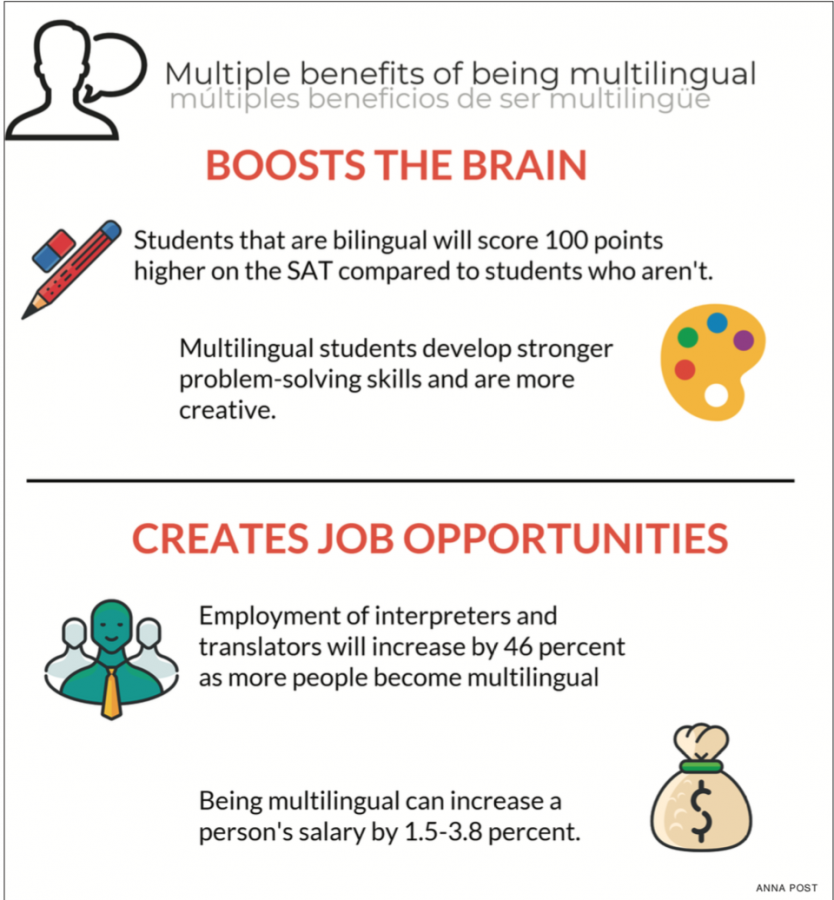The perks of being bilingual
November 15, 2017
Senior Elizabeth Abel’s household isn’t traditional.
Abel comes from a culturally diverse family. Her father, an American is trilingual, and her mother speaks her native language, Spanish.
Although Spanish was Abel’s first language, she speaks both English and Spanish. Abel feels that being bilingual has allowed her to benefit from both cultures. She said her house serves as a cultural melting pot.
“It’s definitely allowed me to see different perspectives and especially with what’s going on today with the election and stuff,” Abel said. “Knowing that there’s people that go through different things, so it allows me to see multiple perspectives.”
Junior Diana García also comes from a multicultural background. She is originally from Mexico and spoke Spanish before moving to the U.S. four years ago. García’s noticed that her strong Spanish roots allow her to understand more cultures and languages.
“It’s just nice to have something to talk about and when you say, ‘I’m bilingual,’ it’s a conversation starter,” García said. “I think it’s something that unites a person with another person. You feel like you have a connection. Something in common.”
According to www.psychologytoday.com, some regions of bilingual brains are more active when performing linguistic tasks as compared to monolingual ones.
García has also seen advantages in her academic career. She said she has been able to learn other languages, like German, more easily. Abel has seen the effects, too. She said being bilingual has allowed her to connect with others and is also an asset when applying to college. Both García and Abel hope to become trilingual by picking up German and French, respectively.
“It’s nice because (other bilinguals and I) have that same connection, so usually we can become friends because we have that mutual knowledge and we can speak in two languages, which is fun,” Abel said. “It helps me meet more people. It connects me to other people who speak similar languages. It definitely helps me with colleges and stuff, so that’s a cool thing.”
In addition to its cultural benefits, being bilingual is also helpful in job seeking. According to the Department of Labor, about 25,000 jobs are expected to open up between 2010 and 2020. About 12,000, or 48 percent of those jobs will require a knowledge of a second language. The demand for multilingual individuals has increased.
García and Spanish teacher Tamara Shepard agree that language skills are valuable in the labor market. Shepard, who is trilingual, said knowing a second language could help students gain a competitive edge in job hunting.
Even if one’s goal when learning a new language isn’t to get a job, Shepard said immersing oneself in another language is always positive. She says the perks are even more broad than communication and on-the-job skills, and that learning another language benefits a student in all aspects of their lives.
“It opens up your eyes to brand new cultures you may have not investigated before,” Shepard said. “I think a lot of folks when they’re learning a second language realize things about English that they didn’t know before, and it offers up a way of broadening your horizons. When you study the language and learn the culture, you’re thinking about things in different perspectives.”
García has experienced this change in perspective first-hand through learning English—it has taught her to be more sympathetic towards others.
“I feel like I don’t judge people if they have an accent. I praise them because I’m like, ‘Wow they already know another language, and they’re learning English and I was there too,’” she said. “I think I used to have a thicker accent and it’s like, ‘I know what you’re (going) through.’”













